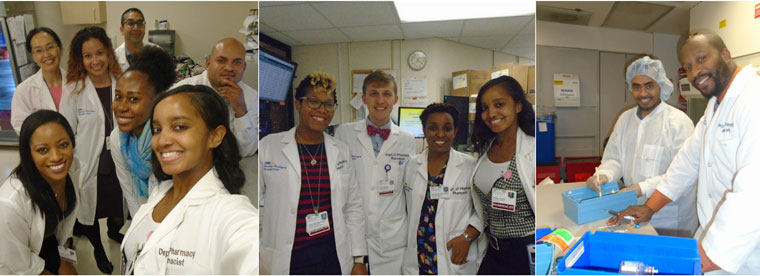Find care now
If you are experiencing a medical emergency, please call 911 or seek care at an emergency room.

MedStar Washington Hospital Center pharmacists play a vital role in the healthcare team and are involved in monitoring safe and effective use of medications. They counsel patients and provide vital drug information to health professionals. Pharmacists are educated and trained to work in direct patient care environments, including hospitals, clinics, and a variety of other healthcare settings. Celebrated in October, Pharmacy Week acknowledges the contributions that pharmacists, pharmacy technicians, and pharmacy support staff make to enhance patient care.
To help everyone use medications wisely, here are 5 Top Things Pharmacists Say You Need to Know:
1. Here’s how to dispose of old medications.
As a rule, don’t flush your leftover medications down the toilet. Find a local drug “take back” program (visit DEA.gov or call 1-800-882-9539 for locations). If no medicine take-back programs are available, you can also follow these simple FDA-approved steps to dispose of most medicines in the household trash.
- Mix medicines (do not crush tablets or capsules) with an unpalatable substance such as dirt, kitty litter, or used coffee grounds;
- Place the mixture in a container such as a sealed plastic bag;
- Throw the container in your household trash;
- Scratch out all personal information on the prescription label of your empty pill bottle or empty medicine packaging to make it unreadable, then dispose of the container.
2. Why choosing to take expired meds, even OTC, is a bad idea.
Just throw them away. Expired medicines may be less effective. An infection – sinus, ear, skin or other – may not respond to old antibiotics. Worse, the expired antibiotic can allow the infection to progress, which could land you in the hospital. Further, old medications are an accident waiting to happen when they are discovered by children or taken by someone for whom they were not prescribed.
3. You can’t split every pill.
Splitting a tablet, especially if it is not scored, could result in a different dose than what was intended. In addition, it is completely unsafe to split capsules or time-released drugs. Always check with your pharmacist prior to splitting medicines.
4. Get medications filled by a single pharmacy or pharmacy network, if possible.
Pharmacists understand how drugs interact with each other. If the person who fills your latest prescription can see a record of all the medications you are taking, that healthcare professional can flag safety concerns BEFORE you take any new drugs. Countless times, pharmacists catch errors when they call a doctor or nurse to verify that a drug or dosage has been prescribed correctly. Also, the pharmacy counter is your place to ask any and all questions on exactly HOW to take a medication safely (With food? At bedtime? Can you drive while taking it? How to avoid constipation as a side effect? All very important things to know.)
5. Drink the whole glass of water after swallowing a pill.
Drinking more than a few sips of liquid after you take medicine helps ensure that the tablet, capsule or pill does not harm the lining of your esophagus by not going down all the way. In the stomach, the liquid helps the medication be digested, absorbed and moved through your system efficiently. Also, because some medication have a drying effect on the body, getting in a full glass of something that hydrates you is a smart move from the beginning.
Have any questions?
For more information on safe, effective drug use? Visit FDA.gov.
Subscribe to Blog
Get health tips and the latest news in your inbox.














